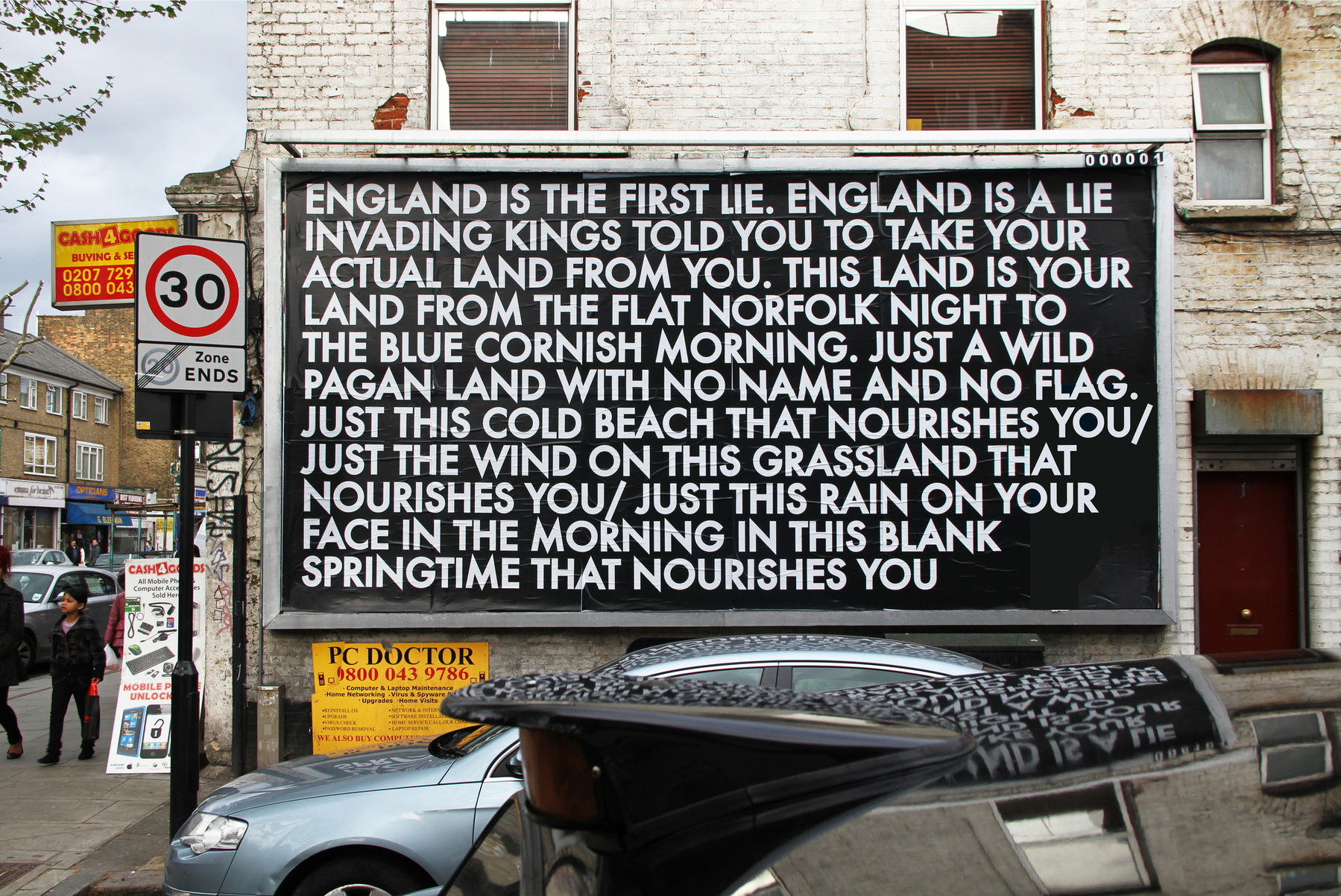Just this cold beach that nourishes you
I’ve come across so much great art and artists that are either directly or obliquely protesting the coronation, monarchy, and everything the Tories stand for. Here’s one from Robert Montgomery which, I think, is actually from the queen’s jubilee.
Source: BILLBOARDS — ROBERT MONTGOMERY
Comportamento Geral
As part of the #NotMyKing protests, I came across a printmaker and artist whose work I explored further. Highly discouraged by my wife from putting up something explicitly anti-monarchy, I instead placed this from Katherine Anteney on view through the window of my home office.
It’s from a Brazilian anti-dictatorship protest song from the 1970s and roughly translated as: “Everything is good, everything is great, but what happens tomorrow, mate, when they take your carnival away?"
Seems appropriate for this weekend, anyway.
The most radical thing you can do is stay home

🐱 Comedy Wildlife Photography Awards 2020 finalists revealed
😂 Extinction Rebellion 'go floppy' when arrested, complains senior Met officer
😮 Birthday party on ship may have led to oil spill in Mauritius, Panama regulator says
🤘 Barbados revives plan to remove Queen as head of state and become a republic
🛂 When you browse Instagram and find former Australian Prime Minister Tony Abbott's passport number
Quotation-as-title by Gary Snyder. Image from top-linked post.
Saturday scrapings
Every week, I go back through the links I've saved, pick out the best ones, and share them here. This week is perhaps even more eclectic than usual. Enjoy!
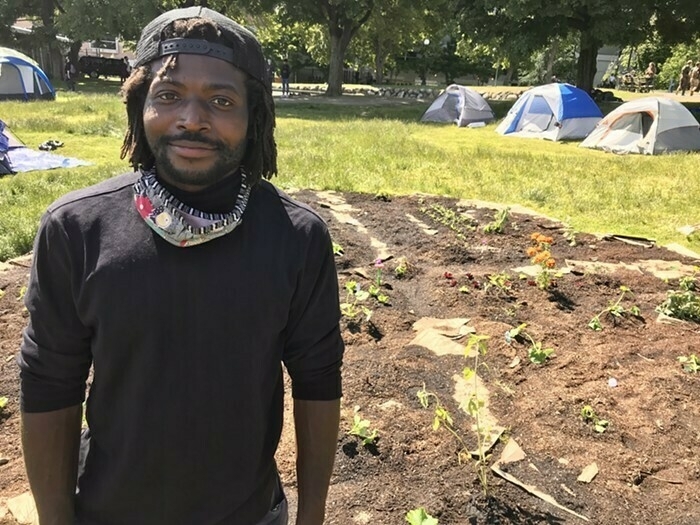
Meet the Farmer Behind CHAZ's Vegetable Gardens
Marcus was the first to start gardening in the park, though he was quickly joined by friends and strangers. This isn’t the work of a casual amateur; Henderson has an Energy Resources Engineering degree from Stanford University, a Master’s degree in Sustainability in the Urban Environment, and years of experience working in sustainable agriculture. His Instagram shows him hard at work on various construction and gardening projects, and he’s done community development at organic farms around the world.
Matt Baume (The Stranger)
I love this short article about Marcus Henderson, the first person to start planting in Seattle's Capitol Hill Autonomous Zone.
The Rich Are 'Defunding' Our Democracy
“Apparently,” comments [journalist David] Sirota, “we’re expected to be horrified by proposals to reduce funding for the militarized police forces that are violently attacking peaceful protesters — but we’re supposed to obediently accept the defunding of the police forces responsible for protecting the population from the wealthy and powerful.”
Sam Pizzigati (Inequality.org)
A lot of people have been shocked by the calls to 'defund the police' on the back of the Black Lives Matter protests. The situation is undoubtedly worse in the US, but I particularly liked this explainer image, that I came across via Mastodon:
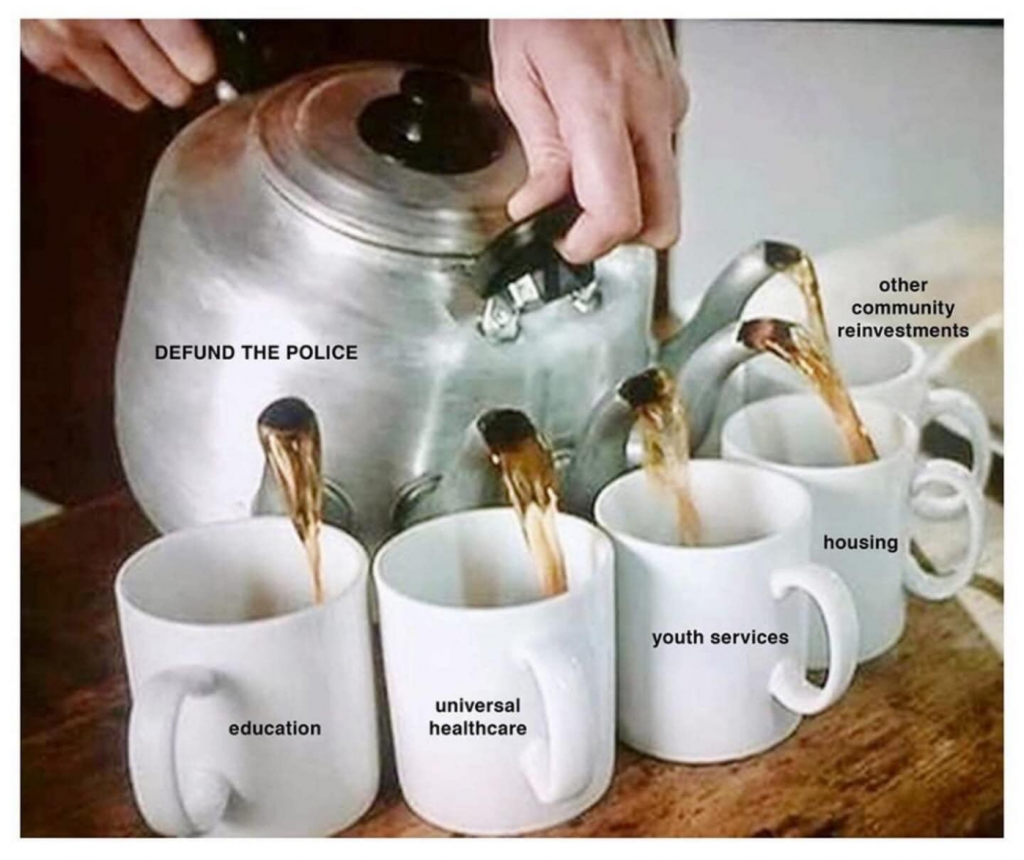
Peasants' Revolt
Yet perhaps the most surprising feature of the revolt is that in-spite of the modern title, Peasants' Revolt didn't gain usage until the late nineteenth century, the people who animated the movement weren't peasants at all. They were in many respects the village elite. True, they weren't noble magnates, but they were constables, stewards and jurors. In short, people who were on the up and saw an opportunity to press their agenda.
Robert Winter
I love reading about things I used to teach, especially when they're written by interesting people about which I want to know more. This blog post is by Robert Winter, "philosopher and historian by training, Operations Director by pay cheque". I discovered is as part of the #100DaysToOffload challenge, largely happening on the Fediverse, and to which I'm contributing.
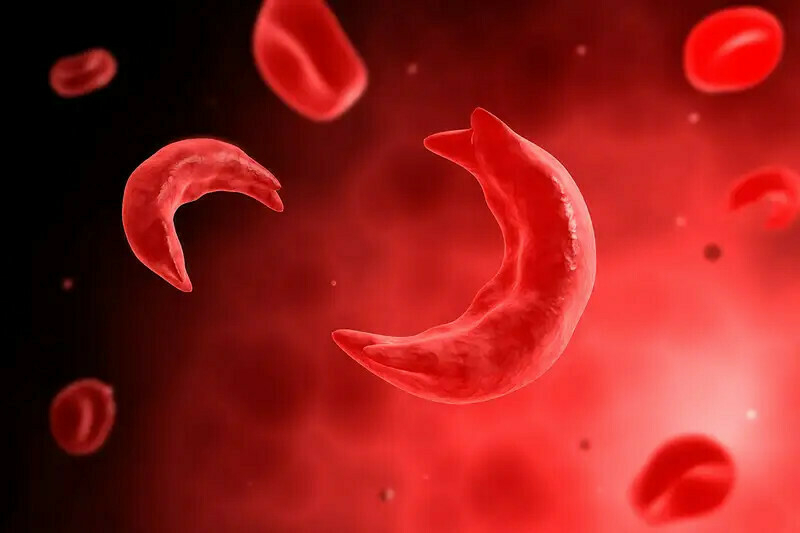
Three people with inherited diseases successfully treated with CRISPR
Two people with beta thalassaemia and one with sickle cell disease no longer require blood transfusions, which are normally used to treat severe forms of these inherited diseases, after their bone marrow stem cells were gene-edited with CRISPR.
Michael Le Page (New Scientist)
CRISPR is a way of doing gene editing within organisms. sAs far as I'm aware, this is one of the first times it's been used to treat conditions in humans. I'm sure it won't be the last.
Choose Your Own Fake News
Choose Your Own Fake News is an interactive "choose your own adventure" game. Play the game as Flora, Jo or Aida from East Africa, and navigate the world of disinformation and misinformation through the choices you make. Scrutinize news and information about job opportunities, vaccines and upcoming elections to make the right choices!
This is the kind of thing that the Mozilla Foundation does particularly well: either producing in-house, or funding very specific web-based tools to teach people things. In this case, it's fake news. And it's really good.
Why are Google and Apple dictating how European democracies fight coronavirus?
The immediate goal for governments and tech companies is to strike the right balance between privacy and the effectiveness of an application to limit the spread of Covid-19. This requires continuous collaboration between the two with the private sector, learning from the experience of national health authorities and adjusting accordingly. Latvia, together with the rest of Europe, stands firm in defending privacy, and is committed to respecting both the individual’s right to privacy and health while applying its own solutions to combat Covid-19.
Ieva Ilves (The Guardian)
This is an article written by an an adviser to the president of Latvia on information and digital policy. They explain some of the nuance behind the centralised vs decentralised contact tracing app models which I hadn't really thought about.
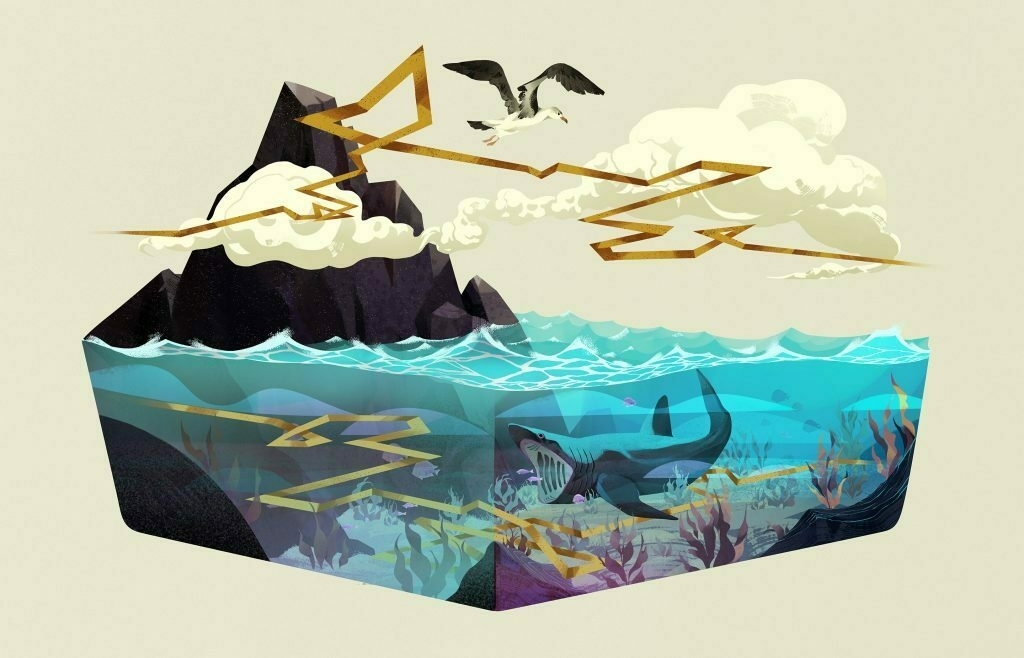
Random Search Wired Into Animals May Help Them Hunt
Lévy walks are now seen as a movement pattern that a nervous system can produce in the absence of useful sensory or mnemonic information, when it is an animal’s most advantageous search strategy. Of course, many animals may never employ a Lévy walk: If a polar bear can smell a seal, or a cheetah can see a gazelle, the animals are unlikely to engage in a random search strategy. “We expect the adaptation for Lévy walks to have appeared only where they confer practical advantages,” Viswanathan said.
Liam Drew (QUanta Magazine)
If you've watched wildlife documentaries, you probably know about Lévy walks (or 'flights'). This longish article gives a fascinating insight into the origin of the theory and how it can be useful in protecting different species.
A plan to turn the atmosphere into one, enormous sensor
One of AtmoSense’s first goals will be to locate and study phenomena at or close to Earth’s surface—storms, earthquakes, volcanic eruptions, mining operations and “mountain waves”, which are winds associated with mountain ranges. The aim is to see if atmospheric sensing can outperform existing methods: seismographs for earthquakes, Doppler weather radar for storms and so on.
The Economist
This sounds potentially game-changing. I can see the positives, but I wonder what the negatives will be?
Paths of desire: lockdown has lent a new twist to the trails we leave behind
Desire paths aren’t anything new – the term has been traced back to the French philosopher Gaston Bachelard, who wrote of “lignes de désir” in his 1958 book The Poetics of Space. Nature author Robert Macfarlane has written more recently about the inherent poetry of the paths. In his 2012 book The Old Ways: A Journey on Foot, Macfarlane calls them “elective easements” and says: “Paths are human; they are traces of our relationships.” Desire paths have been created by enthusiastic dogs in back gardens, by superstitious humans avoiding scaffolding and by students seeking shortcuts to class. Yet while illicit trails may have marked the easier (ie shorter) route for centuries, the pandemic has turned them into physical markers of our distance. Desire paths are no longer about making life easier for ourselves, but about preserving life for everyone.
Amelia Tait (The Guardian)
I've used desire paths as a metaphor many times in presentations and workshops over the last decade. This is an article that specifically talks about how they've sprung up during the pandemic.
Header image by Hans Braxmeier
Saturday soundings
Black Lives Matter. The money from this month's kind supporters of Thought Shrapnel has gone directly to the 70+ community bail funds, mutual aid funds, and racial justice organizers listed here.

IBM abandons 'biased' facial recognition tech
A 2019 study conducted by the Massachusetts Institute of Technology found that none of the facial recognition tools from Microsoft, Amazon and IBM were 100% accurate when it came to recognising men and women with dark skin.
And a study from the US National Institute of Standards and Technology suggested facial recognition algorithms were far less accurate at identifying African-American and Asian faces compared with Caucasian ones.
Amazon, whose Rekognition software is used by police departments in the US, is one of the biggest players in the field, but there are also a host of smaller players such as Facewatch, which operates in the UK. Clearview AI, which has been told to stop using images from Facebook, Twitter and YouTube, also sells its software to US police forces.
Maria Axente, AI ethics expert at consultancy firm PwC, said facial recognition had demonstrated "significant ethical risks, mainly in enhancing existing bias and discrimination".
BBC News
Like many newer technologies, facial recognition is already a battleground for people of colour. This is a welcome, if potential cynical move, by IBM who let's not forget literally provided technology to the Nazis.
How Wikipedia Became a Battleground for Racial Justice
If there is one reason to be optimistic about Wikipedia’s coverage of racial justice, it’s this: The project is by nature open-ended and, well, editable. The spike in volunteer Wikipedia contributions stemming from the George Floyd protests is certainly not neutral, at least to the extent that word means being passive in this moment. Still, Koerner cautioned that any long-term change of focus to knowledge equity was unlikely to be easy for the Wikipedia editing community. “I hope that instead of struggling against it they instead lean into their discomfort,” she said. “When we’re uncomfortable, change happens.”
Stephen Harrison (Slate)
This is a fascinating glimpse into Wikipedia and how the commitment to 'neutrality' affects coverage of different types of people and event feeds.
Deeds, not words
Recent events have revealed, again, that the systems we inhabit and use as educators are perfectly designed to get the results they get. The stated desire is there to change the systems we use. Let’s be able to look back to this point in two years and say that we have made a genuine difference.
Nick Dennis
Some great questions here from Nick, some of which are specific to education, whereas others are applicable everywhere.

Audio Engineers Built a Shield to Deflect Police Sound Cannons
Since the protests began, demonstrators in multiple cities have reported spotting LRADs, or Long-Range Acoustic Devices, sonic weapons that blast sound waves at crowds over large distances and can cause permanent hearing loss. In response, two audio engineers from New York City have designed and built a shield which they say can block and even partially reflect these harmful sonic blasts back at the police.
Janus Rose (Vice)
For those not familiar with the increasing militarisation of police in the US, this is an interesting read.
CMA to look into Facebook's purchase of gif search engine
The Competition and Markets Authority (CMA) is inviting comments about Facebook’s purchase of a company that currently provides gif search across many of the social network’s competitors, including Twitter and the messaging service Signal.
[...]
[F]or Facebook, the more compelling reason for the purchase may be the data that Giphy has about communication across the web. Since many services that integrate with the platform not only use it to find gifs, but also leave the original clip hosted on Giphy’s servers, the company receives information such as when a message is sent and received, the IP address of both parties, and details about the platforms they are using.
Alex Hern (The Guardian)
In my 2012 TEDx Talk I discussed the memetic power of gifs. Others might find this news surprising, but I don't think I would have been surprised even back then that it would be such a hot topic in 2020.
Also by the Hern this week is an article on Twitter's experiments around getting people to actually read things before they tweet/retweet them. What times we live in.
Human cycles: History as science
To Peter Turchin, who studies population dynamics at the University of Connecticut in Storrs, the appearance of three peaks of political instability at roughly 50-year intervals is not a coincidence. For the past 15 years, Turchin has been taking the mathematical techniques that once allowed him to track predator–prey cycles in forest ecosystems, and applying them to human history. He has analysed historical records on economic activity, demographic trends and outbursts of violence in the United States, and has come to the conclusion that a new wave of internal strife is already on its way1. The peak should occur in about 2020, he says, and will probably be at least as high as the one in around 1970. “I hope it won't be as bad as 1870,” he adds.
Laura Spinney (Nature)
I'm not sure about this at all, because if you go looking for examples of something to fit your theory, you'll find it. Especially when your theory is as generic as this one. It seems like a kind of reverse fortune-telling?

Universal Basic Everything
Much of our economies in the west have been built on the idea of unique ideas, or inventions, which are then protected and monetised. It’s a centuries old way of looking at ideas, but today we also recognise that this method of creating and growing markets around IP protected products has created an unsustainable use of the world’s natural resources and generated too much carbon emission and waste.
Open source and creative commons moves us significantly in the right direction. From open sharing of ideas we can start to think of ideas, services, systems, products and activities which might be essential or basic for sustaining life within the ecological ceiling, whilst also re-inforcing social foundations.
TessyBritton
I'm proud to be part of a co-op that focuses on openness of all forms. This article is a great introduction to anyone who wants a new way of looking at our post-COVID future.
World faces worst food crisis for at least 50 years, UN warns
Lockdowns are slowing harvests, while millions of seasonal labourers are unable to work. Food waste has reached damaging levels, with farmers forced to dump perishable produce as the result of supply chain problems, and in the meat industry plants have been forced to close in some countries.
Even before the lockdowns, the global food system was failing in many areas, according to the UN. The report pointed to conflict, natural disasters, the climate crisis, and the arrival of pests and plant and animal plagues as existing problems. East Africa, for instance, is facing the worst swarms of locusts for decades, while heavy rain is hampering relief efforts.
The additional impact of the coronavirus crisis and lockdowns, and the resulting recession, would compound the damage and tip millions into dire hunger, experts warned.
Fiona Harvey (The Guardian)
The knock-on effects of COVID-19 are going to be with us for a long time yet. And these second-order effects will themselves have effects which, with climate change also being in the mix, could lead to mass migrations and conflict by 2025.
Mice on Acid
What exactly a mouse sees when she’s tripping on DOI—whether the plexiglass walls of her cage begin to melt, or whether the wood chips begin to crawl around like caterpillars—is tied up in the private mysteries of what it’s like to be a mouse. We can’t ask her directly, and, even if we did, her answer probably wouldn’t be of much help.
Cody Kommers (Nautilus)
The bit about 'ego disillusion' in this article, which is ostensibly about how to get legal hallucinogens to market, is really interesting.
Header image by Dmitry Demidov
